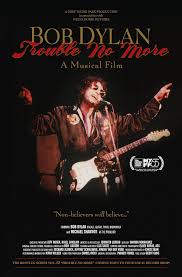BOB DYLAN : TROUBLE NO MORE - A MUSICAL FILM
- Jesus met the woman at the well
- are you ready?
- Solid rock
- slow train
- when he returns
- precious angel
- saved
- do right to me baby (Do unto others)
- ain't gonna go to hell for anybody
- what can i do for you?
- pressing on
- abraham, martin and john
Extras : - shot of love
- cover down, pray through
- jesus met the woman at the well
- ain't gonna go to hell for anybody
- precious angel
- slow train
Label : Columbia
Venue : various locations USA
Recording Date : 1980
Length : 87 minutes
NTSC : 16:9
Release Date : November 3, 2017
Review (IMDB) : The film consists of live footage of Bob Dylan performing gospel music during a 1980 tour. The film also features actor Michael Shannon in the part of evangelical preacher giving sermons that appear between songs throughout the film.
Review (Pitchfork) : The deluxe box concludes with the DVD premiere of a new, hourlong film entitled Trouble No More: A Musical Film. Rather than chronicling the gospel years via a straightforward documentary, director Jennifer LeBeau instead opted to craft an unusual concert film. LeBeau has taken vintage live footage filmed by Ron Kantor and interspersed it with newly-shot sermons, penned by Luc Sante and robustly performed by Michael Shannon (Man of Steel, Revolutionary Road). The movie is bookended with performances of two songs not included on the box's audio portion: a rehearsal of "Jesus Met the Woman at the Well" and a stark, stirring "Abraham, Martin and John" as a duet at the piano between Dylan and Clydie King. The concert footage is intense and fiery, showing a sweat-drenched Dylan, his band, and singers in passionate form on "Solid Rock," "Slow Train," "When He Returns," "Precious Angel," "Do Right to Me Baby (Do Unto Others)" and more. (These performances, though some are edited, are not interrupted with any talking heads or dialogue, but are happily allowed to play out.) A consummate actor, Shannon fully embodies his old-time preacher character from the pulpit. Although the sermons are based on themes in Dylan's songs, such as hypocrisy, avarice, and sin, one wonders why Dylan's own documented raps weren't adapted to paint a more accurate portrait. The DVD boasts options for "Concert Only" and "Sermons Only," and offers six concert bonuses, including alternate and more complete performances.
Review (The Hollywood Reporter) : Diving headlong into one of the most controversial moments in Bob Dylan’s storied career and paying no need to unbelievers, Jennifer Lebeau’s Trouble No More unearths rare concert footage from the singer’s “Christian period,” when he toured small venues playing nothing but songs about his new faith. The singer’s refusal to perform his hits angered fans at the time, and many critics were unkind to the new compositions. A chance for reappraisal comes next month, when Columbia/Legacy’s latest Bootleg Series installment will collect many hours of live recordings from this period. Lebeau’s film will be part of that set’s “Deluxe Edition,” and will be catnip for fans of the albums Slow Train Coming and Saved. But seen on the big screen at the New York Film Festival, it proved something of a come-to-Jesus moment for unconverted viewers as well, loaded with fine performances of songs that fit comfortably in the songwriter’s canon. Having found this rare material and helped get it into shape (shot on video in 1980, it looked surprisingly good on the big screen), Lebeau makes a bold choice in presentation: She cuts back and forth from the source material to newly shot scenes in which actor Michael Shannon plays an old-school preacher, delivering sermons to an off-camera flock. These homilies were penned by Luc Sante, who says his homework consisted of listening to sermons by the great black preachers who made popular records in the 1920s. While some of the sermons are more true to the idiom than others (Lord, how great it would be to hear a Southern preacher actually chide his flock for eating junk food), their idiosyncrasies are enjoyable. More important, they’re spiritually simpatico with Dylan, who has rarely done anything quite the way others do. Shannon’s contemplative but engaged performance is a good companion to 1980 Dylan, who in these concerts is far from standoffish. On “Saved,” Dylan puts the message across as fervently as a tent-revivalist, his band chugging along like a train on straight tracks. On the rarity “Ain’t Going to Hell for Anybody,” he acknowledges his sinful ways and puts them behind him. Though he has six African-American backup singers, this show doesn’t evoke the sounds of the church the way, for example, Lyle Lovett does with his Large Band. Rather, it weaves them into the kind of rock music Dylan was already making at this time. Tim Drummond’s bass (which cuts loose on songs like “Solid Rock”) and Jim Keltner’s drumming keep Spooner Oldham’s organ from ever sounding churchy. Lebeau presents the songs as intact performances, but avoids concert-film monotony by cutting back to Shannon after each one (and even giving him changes of vintage wardrobe). After the credits, she pulls up a duet shot away from the concert stage: “Abraham, Martin and John,” a lament first recorded by Dion that Dylan played live many times in 1980. Tying the spiritual concerns that drove Dylan during these years with the social ones of the folk era, it’s a lovely choice.
